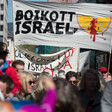The Electronic Intifada 18 June 2015

Church resolutions call for divesting from corporations which profit from Israel’s occupation.
Three churches will debate resolutions this month to divest from companies supporting the Israeli occupation. The Episcopal Church, United Church of Christ and Mennonite Church USA will each discuss Palestine during their conventions.
The discussions are taking place amid strenuous efforts by the Zionist lobby to counter the campaign for boycott, divestment and sanctions (BDS) against Israel.
Sheldon Adelson, the casino billionaire and mega-donor to the Republican Party, recently hosted a conference in Las Vegas to raise a reported $50 million to put more “boots on the ground” in the “war” against BDS.
Desmond Tutu, the South African archbishop, has endorsed the divestment call. In a message to the United Church of Christ this week, he affirmed that “economic pressure can force the most powerful to the table.”
All of the resolutions in question cite the Kairos Palestine document, signed by some 3,000 Palestinian Christians, which calls for “boycott and disinvestment as tools of nonviolence for justice, peace and security for all.”
The resolutions follow initiatives taken by other churches in response to the Palestinian call for BDS.
Last year, the Presbyterian Church USA decided to divest from Hewlett-Packard, Motorola and Caterpillar, all of which have supplied equipment to the Israeli military.
In 2012, the United Methodist Church voted against divestment, while approving a boycott of goods from Israeli settlements in the occupied West Bank.
The church’s pension board has since decided to divest from the security firm G4S, which provides services to Israeli prisons where Palestinians are tortured and held without charge or trial.
Several Quaker bodies have undertaken similar divestment actions.
A resolution drafted by the Episcopal Committee for Justice in Israel and Palestine recommends that investments “that support the infrastructure of Israel’s occupation” should be identified. If those companies continue providing such support, the church would then divest from them.
The resolution also promotes the boycott of settlement products and businesses.
It is one of several resolutions relating to Palestine proposed for the church’s convention.
Two other resolutions name Hewlett-Packard, Motorola and Caterpillar. A separate one targets G4S.
Israel meets definition of apartheid
One indicator of the challenge faced by BDS advocates in the Episcopal Church is that Katharine Jefferts Schori, who serves in its top leadership role as presiding bishop, recently undertook a pilgrimage in Palestine, accompanied by Steve Gutow, a rabbi who heads the Jewish Council for Public Affairs. A year ago, Gutow denounced the Presbyterian Church USA divestment vote as “outrageous” and “divisive.”
The two resolutions more likely to gain Jefferts Schori’s support avoid BDS and instead urge members “to take immediate steps to increase their understanding of the issues” and to encourage “peacemaking and mediation” based on “civil dialog over controversial and confounding issues.”
The United Church of Christ convention will also consider multiple resolutions on these issues, including one declaring that Israel’s occupation meets the definition of apartheid under international law. A separate resolution drafted by the UCC Palestine Israel Network calls for a settlement boycott and divestment from Hewett-Packard, Motorola, Caterpillar and G4S, as well as Veolia, the French corporation that has been involved in building a tramway in occupied East Jerusalem.
The resolution notes that “despite years of corporate engagement and the submission of shareholder resolutions … few companies have withdrawn any of their operations that support the occupation.”
Organizers are optimistic about the resolution’s chances, since it passed easily in each of the regional conferences where it was considered, including the most recent vote at a Minnesota conference where it was passed by 90 votes to 60. UCC Palestine Israel Network’s resolution was even highlighted on the church’s Facebook page.
The UCC Palestine Israel Network has raised concerns, however, that a resolution on “socially responsible investment” proposed by United Church Funds and the church’s pension boards could “inappropriately restrict the freedom” of the church regarding “economic leverage.” This proposal would reserve the right of these church investment bodies to determine when divestment was appropriate as a “last resort.”
“Follow your conscience”
“Investment in Palestine — without divestment from the Israeli occupation — only continues to underwrite the status quo,” the Palestinian businessman Sam Bahour has stated. “We don’t want a more beautiful prison to live in. We want the prison walls dividing Palestinians from Palestinians to come down, and that won’t happen unless economic pressure is placed on Israel to end the occupation.”
The Mennonite Church USA has only one resolution addressing “how our financial lives are enmeshed in the policies of occupation, through our investments, individual purchases and tax dollars.” It does not name specific companies, but would require an annual review of church investments “for the purpose of withdrawing investments from corporations known to be profiting from the occupation and/or destruction of life and property in Israel-Palestine.”
It calls on members to avoid settlement products, and consistent with its pacifist tradition, calls for “an end to US military assistance to all countries, including Israel.”
The Mennonite Palestine Israel Network drafted the resolution. Some leaders of the church are likely to be sympathetic as they are known to have participated in “come and see” tours to Palestine, which exposed them to the realities of Israel’s occupation.
MCUSA cooperated with the Mennonite Central Committee, the church’s relief, development and advocacy organization, and Everence, a Mennonite-affiliated financial services firm, to organize and fund the tours.
“My worldview changed as a result of visiting Palestine-Israel,” Joy Sutter, an MCUSA executive board member, told The Electronic Intifada. Since returning she has found it challenging “to help others understand that we have an apartheid situation in this conflict.”
Each of these churches has received offers of support from Jewish Voice for Peace, which had previously assisted Presbyterian Church USA members wishing to express solidarity with Palestine.
“When we were in Detroit last year, we were saying to the Presbyterians that whatever decision they were going to take — for or against divestment — they are going to have a number of Jews upset at them, because Jews are divided on this issue,” Sydney Levy, Jewish Voice for Peace’s advocacy director, told The Electronic Intifada. “Their job is not to please the Jews. Their job is to follow their conscience and do so based on principle.”
While Jewish Voice for Peace’s budget cannot compare with Adelson’s coffers, its membership has soared over the past year as the only major US Jewish group that supports BDS. It is now raising funds to send Levy and other staff to the Episcopal and UCC gatherings.
“Churches have been relatively shy because of their concerns about relations with Jewish communities,” said Levy. “What we are telling them is that now is the time to take action.”
Sheldon Adelson warned at his Las Vegas fundraiser that “We are losing the war against the boycott.”
It may be too early for Zionists to make such sweeping statements. But if three US churches vote to divest from corporations aiding Israeli apartheid, then it will certainly represent a defeat for Adelson.
Editor’s note: an earlier version of this story incorrectly stated that the Episcopal Church resolution was drafted by the Episcopal Peace Fellowship Palestine Israel Network. It has been corrected to state that it was drafted by the Episcopal Committee for Justice in Israel and Palestine.
Ryan Rodrick Beiler is a freelance photojournalist and member of the ActiveStills collective and lives in Oslo, Norway.
Tags
- church divestment
- divestment
- BDS
- Episcopal Church
- United Church of Christ
- Mennonite Church USA
- Sheldon Adelson
- Desmond Tutu
- Archbishop Desmond Tutu
- Presbyterian Church USA
- United Methodist Church
- Episcopal Peace Fellowship Palestine Israel Network
- Hewlett-Packard
- Motorola
- caterpillar
- G4S
- Katharine Jefferts Schori
- Steve Gutow
- UCC Palestine Israel Network
- Sam Bahour
- Mennonite Palestine Israel Network
- Mennonite Central Committee
- Joy Sutter
- Jewish Voice for Peace
- Sydney Levy





